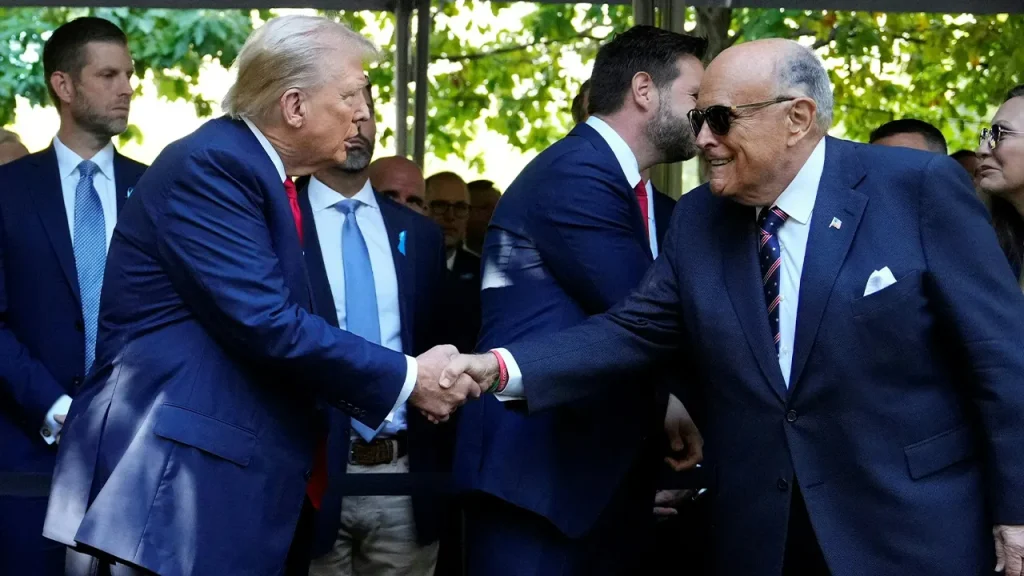Listen to the article
President Trump has issued sweeping pardons to dozens of allies who faced charges related to efforts to overturn the 2020 presidential election, according to an announcement from U.S. Pardon Attorney Ed Martin on Sunday night.
The pardons, described as “full, complete and unconditional,” cover high-profile figures including former New York City Mayor Rudy Giuliani, former White House Chief of Staff Mark Meadows, and attorney Sidney Powell. These individuals played central roles in legal challenges to the 2020 election results and various strategies to prevent the certification of President Biden’s victory.
Martin shared Trump’s proclamation on social media platform X, posting the document in response to his own May 26 message that read, “No MAGA left behind.” The timing comes as several cases against Trump allies were advancing through the court system in multiple states.
“This proclamation ends a grave national injustice perpetrated upon the American people following the 2020 Presidential Election and continues the process of national reconciliation,” the document states. Trump explicitly noted that he did not include himself among those pardoned.
The pardons represent one of the most extensive uses of presidential clemency power in recent history and effectively nullify numerous ongoing prosecutions across several jurisdictions. Legal experts have long anticipated such a move, though the comprehensive nature of the pardons has surprised some observers.
The recipients faced various charges in states including Georgia, Arizona, and Michigan, with allegations ranging from conspiracy to commit election fraud to racketeering. Giuliani, who served as Trump’s personal attorney following the 2020 election, faced particularly serious legal jeopardy in Georgia’s Fulton County, where District Attorney Fani Willis had brought charges against several Trump associates.
Powell, another attorney who represented Trump after the election, had become known for promoting unfounded theories about voting machines and international interference in the election. Meadows, who served as Trump’s final White House Chief of Staff, had been implicated in several post-election schemes, including the infamous call to Georgia Secretary of State Brad Raffensperger in which Trump asked officials to “find” votes.
The pardons mark a significant moment in Trump’s second administration, effectively erasing legal consequences for those who supported his claims of election fraud in 2020. Critics argue the move undermines accountability, while supporters view it as correcting what they perceive as politically motivated prosecutions.
Presidential pardon power is nearly absolute for federal crimes, though its application to state-level prosecutions remains legally contentious. Several of the most serious cases against Trump allies, including the Georgia RICO case, were state rather than federal prosecutions, potentially setting up future court battles over the reach of these pardons.
The Justice Department has not yet issued a formal statement on how it will handle the various cases affected by the pardons, though prosecutors are expected to drop charges against those covered by the proclamation.
The pardons come amid a broader effort by the Trump administration to revisit and reframe the narrative around the 2020 election and its aftermath. The president has frequently described the prosecutions of his allies as “witch hunts” and political persecutions rather than legitimate law enforcement actions.
As news of the pardons spreads, legal analysts are beginning to assess the full scope of cases affected and the precedent this sets for future administrations dealing with politically charged prosecutions.
Fact Checker
Verify the accuracy of this article using The Disinformation Commission analysis and real-time sources.




14 Comments
The timing of these pardons, as cases against Trump allies were progressing, raises concerns about the impartiality of the justice system. However, the president does have broad pardon powers, even if they are seen as politically motivated.
It’s a complex issue with valid arguments on both sides. Reasonable people can disagree on whether this was an appropriate use of presidential authority.
I’m curious to hear legal experts’ take on the scope and potential consequences of these pardons. Do they set a concerning precedent, or are they within the president’s constitutional powers?
Regardless of one’s political leanings, this is an important development that merits close scrutiny and thoughtful discussion.
While the president has the authority to issue pardons, the timing and recipients of these particular pardons raise serious ethical concerns. It appears to be an effort to shield allies from the consequences of their actions.
This decision will undoubtedly be heavily scrutinized and debated in the coming weeks and months.
This is a controversial and politically-charged move by Trump. While his supporters may view it as protecting allies, critics will see it as an abuse of presidential power to shield those involved in efforts to overturn the 2020 election results.
It will be interesting to see how this decision is received and what legal and political ramifications may follow.
These pardons seem to signal that Trump is still determined to fight the narrative that the 2020 election was stolen, even after leaving office. It will likely embolden his most ardent supporters but further alienate his critics.
It’s a move that could have lasting repercussions for the country’s democratic institutions and political polarization.
While I understand the argument that the president has the constitutional authority to issue pardons, the timing and recipients of these particular pardons seem highly questionable and politically motivated. It’s a troubling precedent.
This decision will likely further erode public trust in the justice system and deepen the partisan divide in the country.
Regardless of one’s political affiliation, these pardons seem to undermine the rule of law and the integrity of the electoral process. It’s a concerning development that deserves close attention from the media and the public.
The long-term implications of this decision could be far-reaching and damaging to democratic norms and institutions.